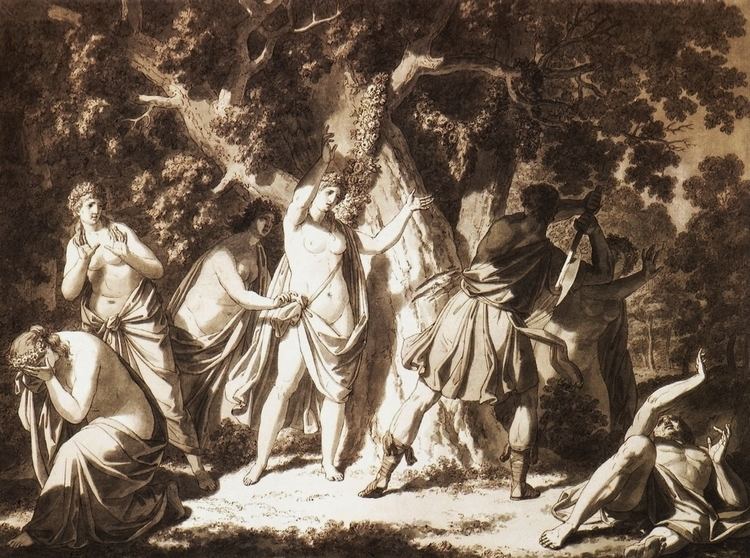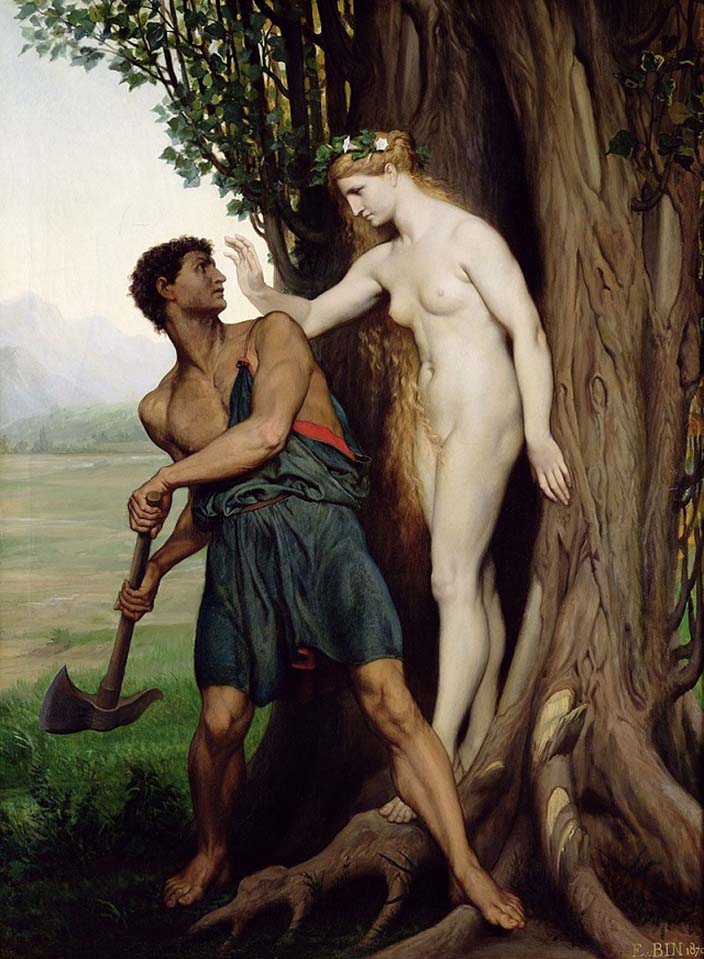Erysichthon
GO TO:
ERYSICHTHON OF THESSALY
ERYSICHTHON OF ATTICA
In Greek mythology, Erysichthon (Ancient Greek: Ἐρυσίχθων, meaning "earth-tearer") refers to two different individuals:
Erysichthon of Thessaly (Ἐρυσίχθων ὁ Θεσσαλός)
Erysichthon of Attica
Erysichthon, a giant (although Callimachus suggests that the giant and Erysichthon of Thessaly are one and the same individual)
Erysichthon of Thessaly
In Greek mythology, Erysichthon of Thessaly, was a King of Thessaly. He was sometimes called Aethon.
Erysichthon was the son of Triopas possibly Hiscilla, daughter of Myrmidon and thus, brother to Iphimedeia and Phorbas. In some accounts, however, he was called instead the son of Myrmidon possibly by Peisidice, daughter of Aeolus and Enarete, and thus, brother to Antiphus, Actor, Dioplethes, Eupolemeia and Hiscilla.
Callimachus calls Erysichthon a king of Thessaly, whilst Ovid, gives no such title to the son of Triopas. Ovid though would tell of Erysichthon being father to Mestra, who Poseidon once took advantage of.
Similar tales are told by both Callimachus and Ovid, although both give different embellishments to the tale. Near to where Erysichthon resided (potentially Dotium in Thessaly) was a grove sacred to the goddess Demeter. The grove abounded with every sort of tree, but at its heart was a mighty oak (or poplar).
Into the grove came Erysichthon, and his attendants, intent on cutting down the trees to construct a banqueting hall. Thus, Erysichthon once ordered all trees in the sacred grove of Demeter to be cut down.

One huge oak was covered with votive wreaths, a symbol of every prayer Demeter had granted, and so the men refused to cut it down. Erysichthon grabbed an axe and cut it down himself, killing a dryad nymph in the process. The nymph's dying words were a curse on Erysichthon.
Callimachus tells of how Demeter actually came to her sacred grove in disguise when the first axe blow fell, and attempted to dissuade Erysichthon from his action, but yet the son of Triopas continued. In either event, for the desecration of her sacred grove, Demeter did indeed meet out punishment.
Demeter responded to the nymph's curse and punished him by entreating Limos, the spirit of unrelenting and insatiable hunger, to place herself in his stomach. From the moment Erysichthon awoke, to the moment he went to sleep, he would be eating, as banquet after banquet was laid before him; and yet the more he ate, the more he craved food.
Demeter would also ensure that his nights were also disturbed, for the Oneiroi were sent out, and each night Erysichthon would dream of food and banquets. Such insatiable hunger, was also said to have been a punishment given to Erysichthon’s father, Triopas, who had destroyed a temple of Demeter in Thessaly to gain building materials for his own house.
Erysichthon sold all his possessions to buy food, and after eating his horses and mules as well, Erysichthon still remained hungry. As a last resort he sold his own daughter Mestra into slavery. Mestra did not wish to be owned by anyone, and praying to her former lover Poseidon, she asked for help. Poseidon gave Mestra the ability to change shape, and so she escaped from the man who she had been sold to.
Erysichthon used her shape-shifting ability to sell her numerous times to make money to feed himself, but no amount of food was enough; and eventually Erysichthon was so hungry that he began to eat himself, and this it was that his insatiable hunger eventually killed him.

Erysichthon of Attica
In Greek mythology, Erysichthon was the son of King Cecrops I of Athens and Agraulus. He died childless during his father's reign. He was said to have died in Prasiae (modern Porto Rafti), on the east coast of Attica, as he was returning from the holy island of Delos with a statue of Eileithuia, goddess of childbirth.
Of the three ancient wooden images of the goddess that could be seen at her temple at Athens, one was identified as the image that Erysichthon had brought from Delos.
According to Pausanias, Erysichthon's tomb could be seen at Prasiae, where his corpse was said to have been buried after his ship had arrived in port.

Sources
Ovid, Metamorphoses 8.756
Pseudo-Apollodorus, Bibliotheca 1.7.4
Homeric Hymns to Apollo, 3.211
Athenaeus, Deipnosophistae 10.9b
Pseudo-Apollodorus. Bibliotheca, 1.7.3
Scholia on Homer, Iliad, 16. 177
Apollonius Rhodius, Argonautica, 1. 54
Hyginus, Poetical Astronomy, 2. 14
Ovid. Metamorphoses VIII, 738-878
Callimachus, Hymn to Demeter, 34 ff
Ioannis Ziogas, Ovid and Hesiod, p. 141
Pseudo-Apollodorus, Bibliotheca 3. 14. 2
Pausanias, Description of Greece, 1. 2. 6; 1. 18. 5; 1. 31. 2













